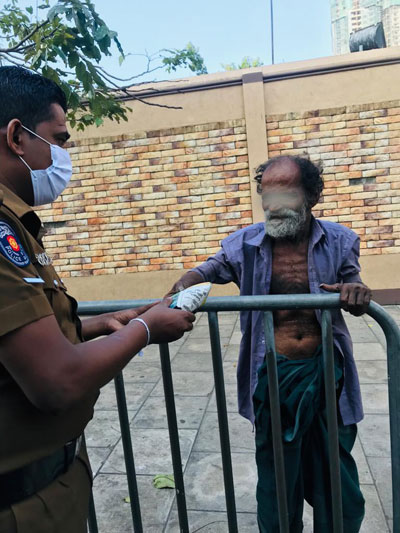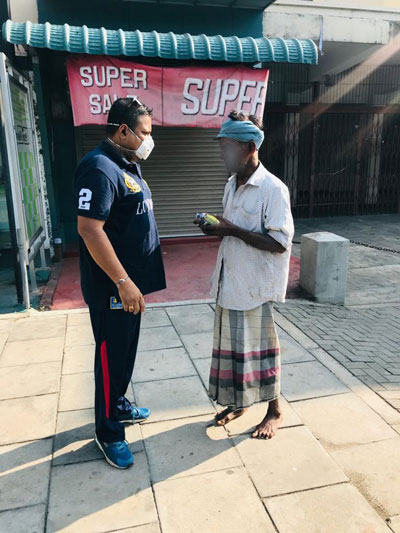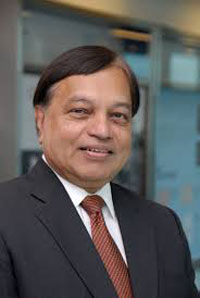News
Living in the times of ‘quarantine curfew’
View(s):

Not forgetting the homeless.
As Sri Lanka went into lockdown with different areas facing curfews at different times, the districts of Colombo, Gampaha, Kalutara and Jaffna have been assessed as ‘high-risk’.
While many commended the good work done by the public health officials down to the grassroots, the other sectors which worked night and day ensuring a silent service were healthcare staff spread across hospitals and the security forces personnel.
In the marathon task of ‘contact tracing’, the Epidemiology Unit was tracing all the contacts of confirmed cases of COVID-19 and calling them constantly to check on their health status, while Medical Officers of Health (MOHs) and Public Health Inspectors (PHIs) were also doing the same for all those in home quarantine.
To give the scope of the magnitude of the job done by the Epidemiology Unit, which had the ready support of the security forces at all times, according to sources, 72 people who had come into contact with the Chinese woman tourist who was the first case reported in Sri Lanka had been traced.
This was while 56 people, the first Sri Lankan patient (the tour guide) had come into contact with, had also been traced.
These were just drops in the ocean, as the number of people infected with COVID-19 jumped the 100 mark.
With the curfew in place, the Sunday Times checked how the essential services managed with regard to their supplies. Sources from different hospitals confirmed that suppliers who are on tender to provide food are doing so and staff and in-ward patients are given their meals without disruption.
The Deputy Inspector General (DIG) of Police, Ajith Rohana, told the Sunday Times that while police personnel have been provided with face-masks and gloves to ensure their health safety, food and water are also being supplied and “we have nothing to worry as of now”.
 As of March 26, the leave of all police personnel numbering 83,000, has been cancelled until April 10 as they have to perform not only their ‘usual’ role of crime-fighting and traffic control but also this emergency humanitarian task which involves ensuring that those in home quarantine are adhering to it as well as managing the large crowds that come onto the streets when the curfew is lifted, to buy their necessities.
As of March 26, the leave of all police personnel numbering 83,000, has been cancelled until April 10 as they have to perform not only their ‘usual’ role of crime-fighting and traffic control but also this emergency humanitarian task which involves ensuring that those in home quarantine are adhering to it as well as managing the large crowds that come onto the streets when the curfew is lifted, to buy their necessities.
Reiterating that the curfew has been imposed to contain the spread of COVID-19, he explained that it is lifted periodically to allow people to obtain essential supplies such as food and medicines. Maintain social distancing (at least a metre’s distance) and do not socialise or visit relatives and friends.
The transport of food including meat and fish and vegetables to storage facilities and distribution centres is allowed without a curfew pass. Security is being provided at wholesale distribution centres, said Mr. Rohana, adding that the curfew will not affect those engaged in farming etc. While rice and paddy distribution does not require a permit, transporters need to have valid documents.
With regard to ‘essential services’, he said that healthcare workers, banks, those in-service sectors such as electricity, water, communications, transport etc., may use their identity cards as curfew passes.
The Tri Forces – Army, Air Force and Navy – also told that uninterrupted food supplies are coming to their personnel from the Defence Ministry.
“We usually have a month’s supply of dry rations and fresh supplies such as vegetables and meat are obtained through suppliers who have tendered to do so,” said the Air Force’s Acting Director of Media, Group Captain Dushan Wijesinghe, with Army spokesman Brigadier Chandana Wickramasinghe echoing the same views.
Touching on the public work done by the Navy, its spokesman Lieutenant Commander IsuruSuriyabandara said they carry out a disinfecting programme of all public places across the country before the curfew is lifted and soon after it is re-imposed. Navy personnel also helped distribute food from Sathosa, while many of the state hospitals including the National Hospital of Sri Lanka and the Kalubowila and Ragama Teaching Hospitals have a navy guard.
Food and logistics for the navy are supplied without interruption by the Defence Ministry, he added.
Homeless and strays not forgotten
What is the fate of the homeless people who sleep under the eaves of shops or on the streets during this prolonged curfew?
n Community policemen along with officials of the Social Services Department are feeding them, assured DIG Ajith Rohana, adding that they have been asked not to walk around but be at designated places.
The navy too has taken the initiative to extend a helping hand to the homeless, the Sunday Times understands.n Meanwhile, animals including stray dogs have also not been forgotten and the police and navy are feeding these hungry mouths.
The Trustee of Rescue Animals Sri Lanka, Anusha David, has appealed to the government to follow India’s example where parliamentarian Maneka Sanjay Gandhi has issued a directive to permit animal welfare workers to feed street dogs, cows and birds during the lockdown there.
Homes need help
The Sunday Times attempted to contact several children’s and elders’ homes but could get through only to two, to find out how they were coping with the lengthy curfew.
“Usually, we have donors coming in to give food, but with the current situation, this is not happening. It is a huge issue for us,” said the President of the Ceylon Fellowship of Service, Prithipura Home, Dr. Ruwani Jayewardene, explaining that securing medicines were also a problem. However, on request, the police granted them permission to use their vehicle and a generous donor had given Rs. 100,000 for them to stock up on medications. Appeals have also resulted in donors sending food.
This issue should have been handled differently as there are many homes and orphanages going through this crisis, she said.
Dr. Jayewardene requested anyone who wished to make a donation to contact: 011-2930447 or 0772877335 or send it to the Bank of Ceylon Acc No: 000-163-0360 and get a receipt by emailing the details to: cfs269prithipura@gmail.com
The Director of the Victoria Home for Incurables, Kingsley Thewarapperuma, said that they are mainly in need of sugar, tea leaves, milk powder and fruits. They are being very careful with the stocks they have as no donors are coming in.
The home has 210 disabled people and a plea is going out to call 0779822998 or 011-2862570 or make a donation to the Bank of Ceylon, Rajagiriya branch A/C No: 3270367.
A ‘peek’ into the homes of Sri Lankans during the curfew
The roads are deserted and the stillness is broken only by the sirens of an ambulance, once in a way, taking someone who is ill to a hospital. The bird calls are loud and clear as also the sound of the squirrels which run up and down trees.
A terrible equalizer – the new coronavirus spreading the disease of COVID-19 – is keeping all and sundry, be they the rich and powerful, the middle class who have white collar jobs or the less-privileged who toil at earning a daily wage, in their homes. For, the only way to halt this rapidly spreading virus has been to break up all social contact with a strictly enforced curfew.
Many a country which experimented with ideas of getting their populations ‘herd immunity’ by exposing them to the rampaging virus are paying dearly for their folly, with shocking numbers ill and also dead.
The Sunday Times ‘peeked’ into the homes of many to see how men, women and children are handling this ‘quarantine curfew’ as the police have dubbed it and not a ‘conventional curfew’ under which people are not restricted from going to neighbours’ homes.
Many of the rich and powerful in their palatial homes with air-conditioning and even surplus stocks of food and drink and credit or debit cards with which they could order stuff online, it was comfortable, sometimes boring. Of course, they had TV channels galore, home movie centres and more. Some of them worked from home on their laptops and iPads.
For SherilMadampage, Dileesha Hettiarachchi and others from the middle class whose parents are either employed in the private sector or in the security forces, they were grateful, even in this unpredictable atmosphere, for the precious family time.
Away from the rush of the rat race, they had time to think, some said, reliving how a week ago, they were running here and there, working, sitting for exams or meeting friends.
They, however, concede that there is some tension in households, with days telescoping into nights, without any forward planning.
“I never thought I can bake or cook being a male, but ended up baking a yummy cake,” says Dileesha, while Sheril is now indulging in learning the guitar all by herself.
“Though I was into music and loved to learn to play the guitar, I never had time to focus,” she says.
When the curfew was lifted for several hours, some of them joined their parents to shop for necessities.
Many people were worried about the economic fallout on their jobs, for they know every sector is in trouble. “We do not know what the future holds and it’s time we all think out of the box and most importantly help each other,” was the common view.
In the rural areas, people went about their work – waking up, cooking a simple meal, heading to the fields for farming, to pluck tea, tap rubber, work in kukul (poultry) farms or look after coconut estates, came back home in the evening, with the routine continuing daily.
Kumari, a mother of two in Meegalawa, 12 kilometres interior from Galgamuwa, works in the wela where they grow paddy, batu (brinjal), miris (green chillies) and peni-komadu (water melon). So it is home to the wela and back home, getting their basic necessities from the village kade.
On the estates, a person from Bogawantalawa said that they fan out on the slopes to pluck the tea-leaves in the mornings. Hardship comes with having to take a bus, the distance is a 50-rupee ticket, to get their provisions.
The hardest-hit seemed to be people like Fathima Zulfika who lives in the Maligawatte flats. Like her neighbours, she does daily work as a maid in several households and her husband and the other men take up any-odd job they can find.
Her employers provided her with dry rations, other essentials and money to feed her family of four before the curfew was imposed, says Fathima, adding that some others have not been so lucky.
The mosque nearby had distributed Rs. 1,000 to each family to buy some provisions but the money vanished very fast. The army has brought packs of dry rations, selling them at a cost ranging from Rs. 500 to Rs. 1,500 each.
She complains that the shops in the area are fleecing them, selling rice, dhal and tinned fish at twice their usual price. Another worry is the shortage of kerosene with which they cook their meals.
Although Fathima and her family can barely get-by, she helps out when a needy neighbour knocks on her door. “I have been lucky to have people (employers) who give me food bags, it has been a blessing. I can’t say no when my neighbours ask me for a little rice.”
K. Deepika Nishanthi who lives in Thalawathugoda has to feed three sons. She is not able to go to work as a domestic help and her employer has no way of sending her any money.
She is managing these days by dipping into her meagre savings and cooking some of the vegetables that the temple nearby distributed to them, having got them from its garden.
But Deepika is fearful that starvation may be her next and only option.
Crucial answers & all about hantaviruses from SARS-buster Prof. Malik Peiris
Here are some crucial answers from SARS-buster and Professor of Virology at the School of Public Health, Hong Kong University, Prof. Malik Peiris to some queries and concerns raised by the Sunday Times.

Prof.Malik Peiris
What are your views on the measures taken so far by Sri Lanka? Do you think it would help us to curb the situation?
It is difficult for me to comment, since I am not on the ground in Sri Lanka and do not have all the facts. I think there is no doubt that the situation has to be taken seriously to try to prevent COVID-19 taking off in Sri Lanka as it has elsewhere in the world.
What are your views on extensive testing for COVID-19?
One has to look at the testing capacity and make sure that this capacity is deployed effectively. On the one hand, testing capacity has to be scaled up rapidly and it needs to be donemore widely. But RT-PCR testing is complicated and it is not easy to set it up in a hospital that has no experience with the technology – both because of a lack of equipment and trained manpower. Finally, even if all these resources were available, some of the key reagents are now becoming short of supply, for example in Europe and North America. All reasons to have a clear strategy on how to deploy your resources.
Have the criteria for the use of face-masks changed?
Usually, people who are sick are advised to wear them when going out.
It is still true that the best evidence for the effectiveness of masks is – to protect healthcare workers and others in the hospital setting and the use of masks on a patient with respiratory disease can reduce transmission of the infection. The value of masks in protecting infection of healthy people in the community is not convincing.
Should we be worried about the hantavirus that has affected a Chinese in Yunnan? Tell us a little about the hantavirus.
No one needs to worry about hantaviruses at this time. Different hantaviruses are present in many countries in Asia, Europe and the Americas. Some of them have previously caused severe disease or death. Hantaviruses are also present in Sri Lanka. The natural reservoir is rodents and it can cross to humans from rodents. But the important thing is that hantaviruses do not spread from human to human. So clearly, the chance of any hantavirus causing a pandemic is not one that deserves much concern.


